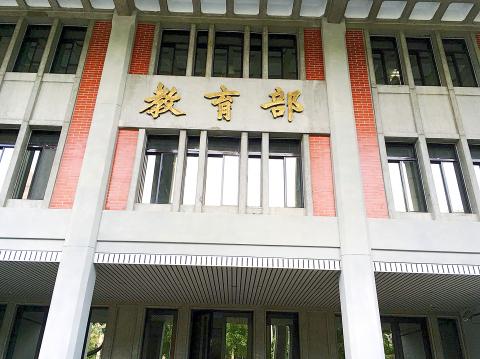Education groups yesterday expressed concern over new curriculum guidelines scheduled to take effect in August after deputy education ministers Yao Leeh-ter (姚立德) and Fan Sun-lu (范巽綠) resigned.
Yao served as acting education minister three times between April last year and earlier this month, following the resignation of former education ministers Pan Wen-chung (潘文忠), Wu Maw-kuen (吳茂昆) and Yeh Jiunn-rong (葉俊榮) — the first time anyone has been an acting education minister three times within nine months.
He is reportedly planning to return to teaching at National Taipei University of Technology.

Photo: Rachel Lin , Taipei Times
Fan served as deputy education minister for a little more than three months after taking office in September last year.
New Cabinet members are to be sworn in today and the ministry has planned a farewell party for Yao and Fan in the afternoon.
Yao was responsible for overseeing higher education and vocational schools, while Fan handled compulsory education.
Their departure would require others to take over their work at the ministry.
Among high-level officials, Deputy Minister of Education Lin Teng-chiao (林騰蛟) is the only one to have overseen compulsory education, as he has served as deputy commissioner of the Taipei’s Department of Education and as the commissioner of the New Taipei City Department of Education.
He has also served as the director of the ministry’s Department of Technological and Vocational Education.
Although K12 Education Administration Director-General Peng Fu-yuan (彭富源) has served as the commissioner of the Taichung Department of Education, he is less familiar with the new curriculum guidelines and was not appointed director-general until Dec. 24.
The National Academy for Educational Research, which manages affairs related to curriculum guidelines, has been without a formal president since July last year, with its vice president, Kung-Bin Kuo (郭工賓), doubling as its acting president.
“Compared with the other ministries, the Ministry of Education [MOE] is the least stable one, having had three ministers in one year,” National Parent Education Volunteer Association director-general Wu Fu-pin (吳褔濱) said.
The new curriculum guidelines are an important policy, yet there would be no senior official familiar with them to help the new minister with their implementation, he said, adding that the situation is “deeply worrying.”
To ensure a smooth transition for schools and students, Wu urged the government to abandon its practice of appointing officials from its inner circle and look for talent to fill in the positions left by Yao and Fan.
Separately, Shih Chien University president Michael Chen (陳振貴) on Saturday said the new education minister would face a series of challenges when implementing the new curriculum guidelines.
The ministry must also deal with the transformation of private universities and colleges, as a steep decline in enrollments is expected next year due to the nation’s dwindling birthrate, he added.
Legislation would be needed to provide the legal basis for schools undergoing transformation to prevent problems, Chen said.
The ministry must work on boosting universities’ global competitiveness, he said, adding that it should increase schools’ research funding to improve their ranking and help them train more talent.
Additional reporting by Wu Po-hsuan

A preclearance service to facilitate entry for people traveling to select airports in Japan would be available from Thursday next week to Feb. 25 at Taiwan Taoyuan International Airport, Taoyuan International Airport Corp (TIAC) said on Tuesday. The service was first made available to Taiwanese travelers throughout the winter vacation of 2024 and during the Lunar New Year holiday. In addition to flights to the Japanese cities of Hakodate, Asahikawa, Akita, Sendai, Niigata, Okayama, Takamatsu, Kumamoto and Kagoshima, the service would be available to travelers to Kobe and Oita. The service can be accessed by passengers of 15 flight routes operated by

Alain Robert, known as the "French Spider-Man," praised Alex Honnold as exceptionally well-prepared after the US climber completed a free solo ascent of Taipei 101 yesterday. Robert said Honnold's ascent of the 508m-tall skyscraper in just more than one-and-a-half hours without using safety ropes or equipment was a remarkable achievement. "This is my life," he said in an interview conducted in French, adding that he liked the feeling of being "on the edge of danger." The 63-year-old Frenchman climbed Taipei 101 using ropes in December 2004, taking about four hours to reach the top. On a one-to-10 scale of difficulty, Robert said Taipei 101

MORE FALL: An investigation into one of Xi’s key cronies, part of a broader ‘anti-corruption’ drive, indicates that he might have a deep distrust in the military, an expert said China’s latest military purge underscores systemic risks in its shift from collective leadership to sole rule under Chinese President Xi Jinping (習近平), and could disrupt its chain of command and military capabilities, a national security official said yesterday. If decisionmaking within the Chinese Communist Party has become “irrational” under one-man rule, the Taiwan Strait and the regional situation must be approached with extreme caution, given unforeseen risks, they added. The anonymous official made the remarks as China’s Central Military Commission Vice Chairman Zhang Youxia (張又俠) and Joint Staff Department Chief of Staff Liu Zhenli (劉振立) were reportedly being investigated for suspected “serious

Taiwanese and US defense groups are collaborating to introduce deployable, semi-autonomous manufacturing systems for drones and components in a boost to the nation’s supply chain resilience. Taiwan’s G-Tech Optroelectronics Corp subsidiary GTOC and the US’ Aerkomm Inc on Friday announced an agreement with fellow US-based Firestorm Lab to adopt the latter’s xCell, a technology featuring 3D printers fitted in 6.1m container units. The systems enable aerial platforms and parts to be produced in high volumes from dispersed nodes capable of rapid redeployment, to minimize the risk of enemy strikes and to meet field requirements, they said. Firestorm chief technology officer Ian Muceus said